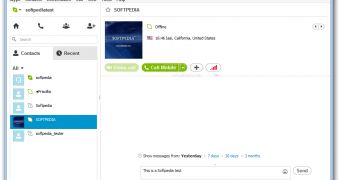Microsoft officially discontinued Windows Live Messenger earlier this year and even though the transition seemed to have been completed very fast, it actually caused quite a lot of problems to users.
Now Redmond has promised to improve the Skype service with some major improvements, some of which are supposed to enhance the experience across all Windows devices.
Part of the same plan through which Microsoft is trying to offer a seamless experience on all Windows devices, including desktops, tablets, and mobile phones, the new Skype version will focus a bit more on data synchronization, especially because the service is making the move to the cloud
Skype product manager Jeff Kunins told The Verge in an interview that Microsoft is aware of all reported issues and promised to improve chat synchronization in future release.
“It’s not that we’ve been trying our best to be amazing at chat for 10 year and sucking at it, it’s that we’ve been doing a great job doing what we were born to do and now people want more out of us and we’re making the investments to expand and be great at that too. We’re not there yet, but we will be,” he said.
One of the improvements to be included in the future Skype version is full message synchronization across devices, with the application to show notification only on the active unit.
“You’ll see us very soon begin rolling that out so users get the benefit of cloud history, synced read state across all of your devices,” he explained without providing any details.
At the same time, Redmond is also promising to fix a bug causing Skype to ring on all synced devices, even though the user has already answered the call.
“That’s just a fun bug we’re working on. It’s one of those that seems like it should be trivial, but it’s actually quite hard especially on some platforms like Windows 8 or on the web,” the Skype official explained.
Skype has also become a key product in Windows 8.1, as Microsoft discontinued its Messaging app and made the VoIP Modern client the default instant messaging solution in the operating system.

 14 DAY TRIAL //
14 DAY TRIAL //